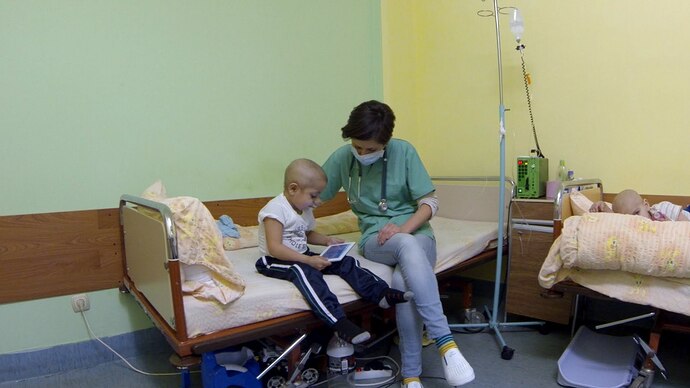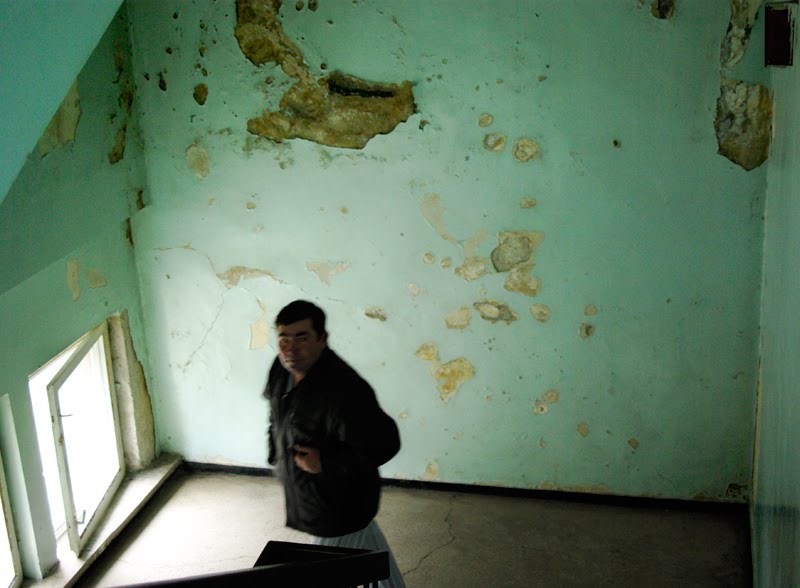This story of mine only wanted to come out through an interview carried out online by Noemi. Hopefully it gives you a peek inside the very personal experience of being part of a sort of grand thing – a network of people becoming active in the healthcare provision chain and caring for each other despite not having met.
Noemi: Introduce us to the time when the cytostatics network came about. Was someone ill able or unable to access treatment from healthcare providers? How did they go by?
Sabina: It was the fall of 2009 when it all started for me: the dizziness, the fatigue, trouble breathing, walking, doing basically anything. In October, I just put it on my crazy life style: mother of two, finishing the PhD, teaching at the Music University.
In November it was clear something else was going on. So I went to a private lab- the thought of a state hospital was too scary- and had a blood work done. Except it did not work the usual way: the results could not be read due to a strange characteristic of the sample.
I knew it was a bad sign, so I turned to my adoptive grandmother, dr. Mirjam Bercovici. She figured it out in minutes, wrote me a recommendation letter and sent me to a real hospital. Autoimmune Hemolytic Anemia – a very rare blood disease- was confirmed and three years of fighting it in Romania and Austria followed.
How did she know and how does this relate to the problems of cytostatics in Romania?
For many years, Mirjam, a hematologist, was the chief of the Pediatric Department in the oncologic ward of the biggest hospital in Romania: Fundeni. She was now long retired, but still having nightmares about kids who could not be saved. Because, you see, even though the treatment had clear indications about when and how to give the medicines, they were not always available. The doctors in her section did miracles. Curing cancer without the necessary drugs is indeed a miracle. The always missed some important dose, they could not offer the kids the standard treatment their colleagues in the West were used to. It was the communist era and everything was very difficult, even for the most important health care center in the country.
So when she sent me there, she knew that I would receive the best possible care, but she was also aware of the limitations of a poor system, as populated with amazing doctors as it was.
During my time in Fundeni, I spent lots of time with people dealing with forms of blood cancer. I was “lucky”: only had to buy once dexamethason for myself, but they were not so lucky: either filling tones of papers to get the newest drugs (the usual line was: we are giving to you, but only with ”the dossier”), either they had to figure out how to obtain certain medication themselves.
But two bone morrow aspirations and numerous transfusions later, when my condition worsened, there were talks about a treatment reserved for Hodgkin’s lymphoma, Mabthera, or Rituximab. Rituximab was not approved in AutoImmune Hemolytic Anemia in Romania at that time. It still isn’t.
Was anyone inside hospitals listening or fighting back?
The situation was rather strange. The drug was expensive, not approved for my AIHA, but available in theory. My roommates with Lymphoma could get it based on the dossier (so not standard). But they were missing other drugs, cheaper cytostatics like Bleomicin, compensated 100% from the state! It was like in the times when Mirjam Bercovici was active, all over again. Like nothing had changed in 40 years. Frustration was working both sides, because treatments sessions were postponed, sick people and doctors being equally worried.
All I knew was that doctors advised patients to figure out how to get the drugs. I had no idea how the people got it, as I was preoccupied with my own, at that time unsolvable, health issues.
Tell us how one would send or get medicine, about the network and how it worked. Were people afraid of the (il)legality of all this?
Drained both mentally and financially, I moved to Vienna, became self employed, paid a high tax on healthcare, tried Rituximab with very little success, worked throughout my illness and also got a splenectomy when a terrible relapse made it clear there is no other way out of this. A few months after, I read an article on a website: How I became a member in the cytostatic network. There were many similarities with my struggle: people not having access to medication as cheap as dexamethason, a description of the oldest Pharmacy in Vienna, which I knew so well, and most of all, the solidarity.
A few weeks later though, I joined the network of Cytostatics. I was going home for a concert and my good friend Simona Tache shared a status form a Youngman who asked if someone is going to Bucharest from Vienna. I knew exactly what it was about, the dots were easy to connect.
I met Vlad Voiculescu that evening, and the next day I followed the instructions and took the transport to Bucharest. Basically, transportation worked like this: You take the medicines in a thermal bag, put it in the fridge and take them out only when you leave the house for the airport. At the security, you take it out and tell the officers you have sensitive medicine there. Sometime they ask you who is it for, sometimes they don’t. You are only allowed to have it for your self or your family. For me, anyone suffering in Romania is family….so it never felt like lying.
In Bucharest, you had Valeriu waiting for you at the airport, or you met him later in the day. Valeriu is a taxi driver who delivers the cytostatics to the Pavel Association – a NGO working for the children in Fundeni, or directly to the ones in need, sick people or caregivers. The news about the Network circulated by word of mouth. Some people knew about its existence, some didn’t. The only thing they knew is that there is someone in Vienna who buys medicines if you give him the prescription and that you can pay him when you can. There was no financial gain, on the contrary. Vlad would receive the prescriptions, buy the cytostatics out of his own pocket and then got the money later. Or much later. No deadlines, no pressure. Just the will to help.
Were all members sufferers or family of sufferers? Was anybody other than Vlad in charge?
When the article about the Network emerged, over 300 people joined the network through the website medicamente-lipsa.ro and found ways to bring home what was missing. Not all of them had sick members of their families. For most, it was just the little they could do in this horrible situation. The website was Med-Alert ‘s Association’ initiative, where Vlad is a founder, and there were more people involved in obtaining the cytostatics and other medicines. Still, Vlad is the one who got the dice rolling. He has the gift of inspiring others to do good, and it’s contagious. Even though the majority of people involved did not now about each other, and many still do not know until this day, as little contact between the carriers of the medicines has happened. Still, the ones who met in real life bonded immediately and I will always state that the main gain of the Network was the amazing friendships resulting from it.
How did things eventually change and what’s the situation so far?
After the article on Hotnews about the Network, a high number of interviews with the authorities filled the tv news evening after evening. The situation was indeed outrageous: you pay the taxes, you have medicine 100% compensated by the state because you pay those taxes, but when it comes to it, they are nowhere available in Romania, and you have to buy them outside the country. Cornered by jurnalists, the Minister of Health made hundreds of promises, with some results. Things were sometimes better, and sometimes worse. The whole System in itself acted like a cancer: remissions and relapses.
At the moment, Vlad Voiculescu is the new Minister of Health. After a tragic event in October 2015, known as the Colectiv fire, where 64 people died, the whole Government was changed and a lot of young – under 45- dynamic people were named in key positions.
One of the actions that Vlad took in the short period of time he’s been in charge is to make a smart alliance with more countries: Bulgaria, Moldova, Croatia, Latvia, Macedonia, Poland, Serbia, Slovenia and Slovakia, in order to get better access to medication. More countries means more people, so a much bigger market, a fact that would discourage the Pharma companies to ignore it by withdrawing a medicine by citing small numbers in sales.
What do you think was the reason for people to participate so actively? If it were another problem and not a deadly disease, would they mobilize as much?
The Public opinion in Romania is, unfortunately, used to crises and bad situation concerning healthcare. The media is full of fundraising events for children or young people who need to get treatment abroad, the news are full of reports of malfunctions of the healthcare system.
In all this mess, there will always be people willing to contribute in any way to the wellbeing of others.
But maybe the reason of this high rate participation in the network of cytostatics is older than we think, with roots in the communist era. Back then, there was a solution for everything: from lack of food to lack of clothes. Everyone knew someone who could help. The only area not available for this kind of help was healthcare. Both doctors and patients were helpless against a system that didn’t truly provide for its beneficiaries. So people developed a true phobia of hospitals, seen as horrible places, dirty and dangerous, a place where some medical act was provided, but where the family took care of the sick person in the most common sense of the term: from bed sheets to food and hygiene products. The 80s and the 90s were the worse years in terms of healthcare. The money was less and less, the needs higher.
The Network did not come out of nowhere. It came from a long series of malfunctions and struggles, from a time filled with nightmares that still populates one of the best Romanian doctor’s dreams.
The production of this article was supported by Op3n Fellowships - an ongoing program for community contributors during May - November 2016.

